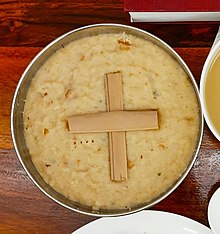Pesaha appam
 | |
| Alternative names | Kurishappam |
|---|---|
| Serving temperature | Dinner[1] |
| Main ingredients | Rice batter |
| Variations | Palappam (fermented bread for festivities and other days) |
| Other information | Cultural cuisine of the Nasrani |

Pesaha appam or Kurisappam[1] is a firm rice cake made by the Christians of Kerala, India, to be served on the night of Maundy Thursday (Pesaha).[1] It is made from rice batter like palappam,[2] but is not fermented with yeast in its preparation.[3] A cross is made using the palm leaves from Palm Sunday, and placed in the middle of the batter.[3][4]
Background
[edit]The Pesaha celebration of Christians falls on Western Maundy Thursday and lasts for a single day.[5][6][7] Traditionally, Pesaha appam is served in a ceremonial manner at night in Christian households across Kerala.[8] The senior male of the family cuts the appam, dips it in paalukurukku (syrup) or Pesaha pal (coconut milk), and serves it to the other family members.[2][8] The brown palkurukku is made mainly using jaggery and coconut milk. The meal also includes small banana variants in Kerala such as poovan pazham or njalipoovan pazham.[1] Some families[who?] have the custom of singing traditional Kerala Nasrani Christian songs during this meal.[9]
The Pesaha appam is said to have been derived from traditional Jewish matza.[10][11][12][13][14][15][8][16] Like matza, it is prepared without yeast.
See also
[edit]References
[edit]- ^ a b c d "Pesaha of Mar Thoma Nasranis". Nasrani Foundation. Archived from the original on 17 April 2019. Retrieved 17 April 2019.
- ^ a b Amprayil, Kuruvilla Cherian (16 March 2008). "Kerala Nazranee Pesaha Receipes [sic]". Nasrani Syrian Christians Network. Retrieved 22 August 2009.
- ^ a b "Pesaha Appam and pal, the toast of Holy Thursday". Manorama. Archived from the original on 17 April 2019. Retrieved 17 April 2019.
- ^ "Pesaha Appam". Mathrubhumi. Archived from the original on 17 April 2019. Retrieved 17 April 2019.
- ^ Nagarajan, Saraswathy (30 March 2021). "'Pesaha' appam is a must on Maundy Thursday in many Christian households in Kerala". The Hindu. ISSN 0971-751X. Retrieved 21 June 2021.
- ^ Waring, Olivia (29 March 2018). "What is Pesaha Appam and why is it eaten on Maundy Thursday?". Metro. Retrieved 21 June 2021.
- ^ "പെസഹാ അപ്പം വീട്ടില് തയ്യാറാക്കാം". Mathrubhumi. Archived from the original on 24 June 2021. Retrieved 21 June 2021.
- ^ a b c Koder S. "History of the Jews of Kerala". The St. Thomas Christian Encyclopaedia of Indial ed. G. Menachery, 1973.
- ^ Chummar Choondal (1983) Christian folk songs, Kerala Folklore Academy pp 33-64
- ^ Menachery, G., ed. (1973) The St. Thomas Christian Encyclopedia of India, B. N. K. Press, vol. 2, ISBN 81-87132-06-X, Lib. Cong. Cat. Card. No. 73-905568; B. N. K. Press
- ^ Menachery, G. (ed.) (1982) The St. Thomas Christian Encyclopedia of India, B. N. K. Press, vol. 1;
- ^ Menachery, G. (ed.) (1998) The Indian Church History Classics, Vol. I, The Nazranies, Ollur, 1998. ISBN 81-87133-05-8.
- ^ Podipara, Placid J. (1970) The Thomas Christians. London: Darton, Longman and Todd, 1970. (is a readable and exhaustive study of the St. Thomas Christians.)
- ^ Leslie Brown, (1956) The Indian Christians of St. Thomas. An Account of the Ancient Syrian Church of Malabar, Cambridge: Cambridge University Press, 1956, 1982 (repr.)
- ^ Thomas Puthiakunnel, (1973) "Jewish colonies of India paved the way for St. Thomas", The Saint Thomas Christian Encyclopedia of India, ed. George Menachery, Vol. II. Trichur.
- ^ T. K. Velu Pillai, (1940) The Travancore State Manual; 4 volumes; Trivandrum)
External links
[edit]![]() Media related to Pesaha Appam at Wikimedia Commons
Media related to Pesaha Appam at Wikimedia Commons

